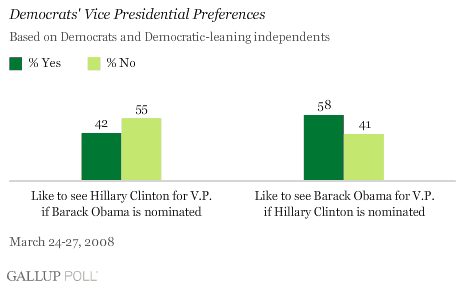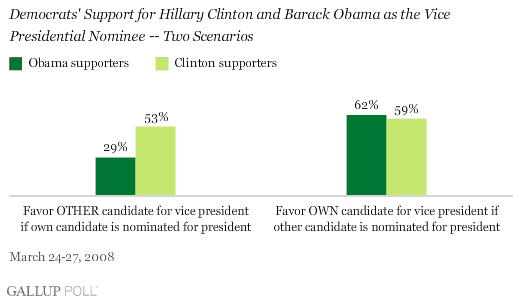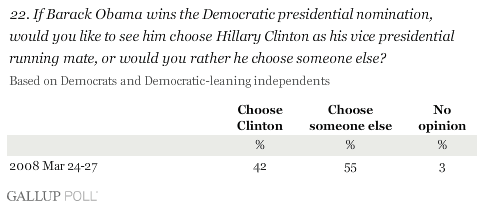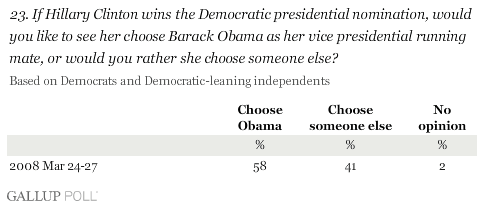PRINCETON, NJ -- Only 42% of Democrats nationwide want Hillary Clinton to be the Democratic vice presidential nominee if Barack Obama wins the presidential nomination, while 55% think he should pick someone else. By contrast, the majority of Democrats -- 58% -- would like to see Obama nominated as vice president if Clinton heads the ticket.

Thus, if the Democratic electorate has its way, Obama will be on the Democratic presidential ticket this fall, as either president or vice president. Clinton's chances of being on the ticket seem more likely to end if she loses the nomination -- at least according to Democrats' weak support for an Obama-Clinton unity ticket.
Lopsided Willingness to Embrace the Opponent
The reason for the disparity is that a relatively small number of Obama supporters -- just 29% --favor Obama choosing Clinton as a possible running mate. Seventy percent say they'd rather he choose someone else. In contrast, a majority of Clinton supporters -- 53% -- would want Clinton to choose Obama for vice president if she is nominated.
Similar percentages (a majority of both Clinton supporters and Obama supporters) say they would want their own candidate selected for vice president should the other candidate win the Democratic nomination for president.

Bottom Line
Former New York Gov. Mario Cuomo, among other Democratic Party elders, has recently argued that the only way for Democratic voters to come together in the fall will be for the two candidates to come together on the Democratic ticket.
Last week, Gallup reported that Obama supporters are more likely to remain loyal to the Democratic ticket in the fall than are Clinton supporters if their respective candidates aren't nominated for president.
However, according to the vice presidential preferences reported here, party loyalty and party unity are not one and the same. Most Obama supporters may be willing to bury the hatchet and vote for Clinton for president, but they don't seem eager to embrace Clinton as Obama's running mate for the sake of party unity.
Survey Methods
Results are based on telephone interviews with 1,005 national adults, aged 18 and older, conducted March 24-27, 2008. Respondents were randomly drawn from Gallup's nationally representative household panel, which was originally recruited through random selection methods. The final sample is weighted so it is representative of U.S. adults nationwide.
For results based on the total sample of national adults, one can say with 95% confidence that the margin of sampling error is ± 4 percentage points.
For results based on the sample of 502 Democrats and Democratic-leaning independents, the maximum margin of sampling error is ±5 percentage points.
In addition to sampling error, question wording and practical difficulties in conducting surveys can introduce error or bias into the findings of public opinion polls.


